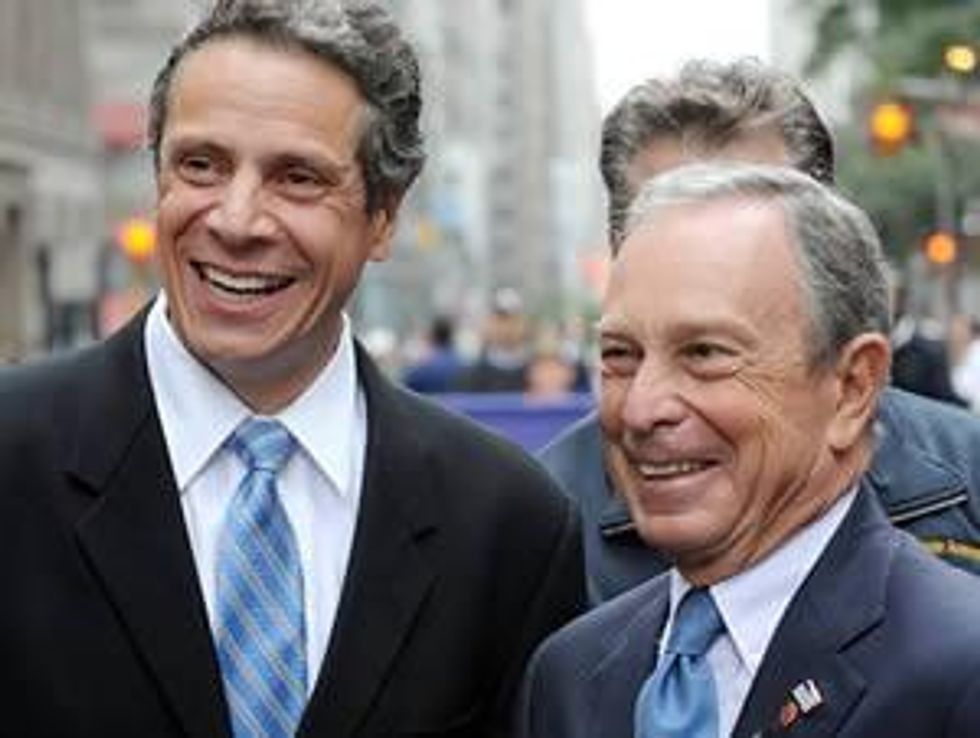As 2011 slips into history, it appears a safe bet that despite tough competition, New York Governor Andrew Cuomo has walked away with this year's coveted award for "stupidest and most offensive analogy made by a non-Republican candidate or a journalist not covering said candidate." Asked why, when he was being forced to lay off thousands of city and state workers, cut the pensions of countless others, and reduce aid to mass transit and education, he insisted on fighting tooth and nail to kill the so-called millionaire's tax on the state's highest earners--a tax, by the way, that would have ensured an additional $4 billion for such needs, and that was favored by 72 percent of respondents in an October poll--Cuomo replied, "The fact that everybody wants it, that doesn't mean all that much." Cuomo then recalled that his father, Mario Cuomo, famously opposed the death penalty despite strong majority support. "Reporters would say, 'Well, people want it,'" Cuomo added. "And the point was, you know, we don't elect--you can't just have as a governor a big poll-taking machine, right?" So Andrew Cuomo's willingness to thwart the will of the majority and stick a thumb in the eye of his own party on behalf of the interests of multimillionaires and billionaires--literally, the "1 percent"--is somehow analogous to the lonely, brave and extremely costly political stand his father took on behalf of condemned prisoners on death row.
Such myopic self-regard should have sunk Cuomo with liberals and
progressives, but to the contrary, all appears hunky-dory in these precincts. Part of the explanation lies in the fact that many liberals have jettisoned the politics of economic equality and prefer to focus on the far less expensive practice of lifestyle liberalism. Andrew Cuomo was the hero of the gay marriage struggle this past summer and hence is beloved in Hollywood and at the
Huffington Post. But no less important has been his ability to conduct a mind-meld operation with many in the MSM to communicate the nonsensical message that, while the governor may insist, on principle, on killing the special surtax, he did not oppose forcing the well-off to pay their fair share to meet the state's burgeoning obligations.
In early December, Cuomo persuaded New York's famously dysfunctional state legislature to pass a new tax plan, which somehow managed to confuse the media sufficiently to satisfy his
1 percent funders and progressive backers simultaneously. Cuomo was immediately lauded as potential presidential timber for this accomplishment. As a New York Observer report explained, "The plan was hailed as a political masterstroke. The millionaire's tax will be allowed to expire, as Mr. Cuomo had promised. Almost everyone's taxes will be cut." Headlines concurred: "New York to raise taxes on the rich," explained the Christian Science Monitor. "Albany Tax Deal to Raise Rate for Highest Earners," added the New York Times. Its reporter Thomas Kaplan went so far as to name "Democrats, Labor Unions and Occupy Wall Street Protesters," together with other "advocates for extending the state's so-called millionaires' tax," as the winners in the struggle. And Newsweek's "Conventional Wisdom" column cheered him on above the caption: "N.Y. gov wows 'em again with proposed tax on wealthy."
As if...
In fact, as the Times editorial-page writers correctly pointed out, the rich need not be troubled by this alleged rate rise. After all, "the biggest tax cut would go to those earning between $300,000 and $2 million a year. That group would see their rates fall to 6.85 percent from as much as 8.97 percent (the rate with the surcharge). Only those earning more than $2 million would pay a new rate--8.82 percent," and even that is lower than it was before the expiration of the surtax. Moreover, "Families earning less than $300,000 would get smaller cuts than many millionaires; a family earning $40,000 to $150,000 would pay
6.45 percent, down from the current 6.85 percent."
So how does one calculate that this somehow represents an increase in taxes on the wealthy, much less a victory for the 99 percent? Easy, with sentences like these: "The only people who will see a higher rate are those who make over $2 million a year...but even their total tax burden will be lower than it was last year," (New York Observer) and "the highest-income earners will be taxed at a lower rate than at present, but at a higher rate than had been expected with the expiration of the surcharge" (New York Times). So the rich's higher taxes are actually lower taxes. And the budget deficit will substantially increase, as will the budget cuts--necessary to retain the state's bond ratings--to those services desperately needed by the working poor, unemployed and unhoused.
Is it any wonder that, as an Observer headline reports, "New York's Rich Are Cool With Cuomo's Tax Tweak"? Billionaire Mort Zuckerman explains, "Look, nobody likes to pay higher taxes.... [But] I'm very comfortable with this thing." No kidding. For the superrich, this tax plan is about as comfortable as 1,800-thread-count microcotton sheets on a Gulfstream G650. And thanks to Cuomo's brilliant psychological jujitsu, reporters and editors are happy to go along for the ride to cheer from the coach seats.
As for the rest of us, well, there's always cake.




